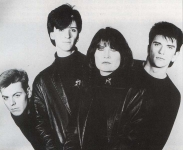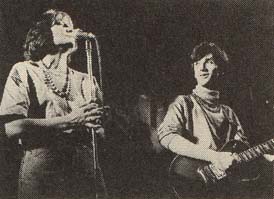The Smiths & Sandie Shaw
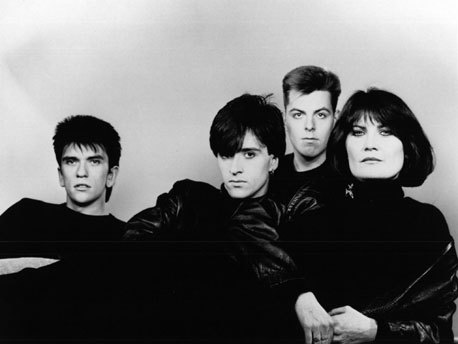
Photo of The Smiths & Sandie Shaw by Peter Ashworth. Reproduced without permission.
NEWS ITEM
This item originally appeared in Smash Hits. (The date of publication is unknown.) 'I Don't Owe You Anything' eventually surfaced as the B-side to Sandie Shaw's 'Hand In Glove' (with The Smiths).

This article about Sandie Shaw was penned by Morrissey himself. Taken from the December 24, 1983 issue of Sounds.
MORRISSEY
on SANDIE SHAW
TRAGICALLY, it is mainly for the disturbingly pleasant 'Puppet On A String' (No. 1, 1967) that most people remember Sandie Shaw for. Handcuffed to the laughably inane Martin-Coulter romp, Sandie was conscripted to the Eurovision Song Contest and won it with a runaway victory unseen since. It would be the first time Britain had won the contest, and 'Puppet On A String' became Sandie's third number one, charting for over five months and selling seven million copies throughout Europe.
The great tragedy of these impressive figures is that they belonged to the record which payed no compliment of any kind to Sandie Shaw as a symbolist. Embroidered around the resistable 'Puppet' there lay a litter of the most vital and inspirational singles ever produced in the history of popular music. Shaw had fallen on 1964 like a thunderbolt.
As the year began she was bespectacled Sandra Goodrich, a factory worker from Essex, who managed to slip backstage at an Adam Faith concert and burst into song for her dreamboat. Faith's manager Eve Taylor was impressed enough to shove Sandra on to the right contacts.
Seconds later, re-christened Sandie Shaw, she was launched into orbit with 'As Long As You're Happy Baby' on the Pye label, which swiftly sashayed out of view. The record was violently followed by 'There's Always Something There To Remind Me' which snatched the number one spot as the year came to an end. It was all enough to have Sandie voted the Best Singer Of 1964.
Without supernatural beauty, Sandie Shaw cut an unusual figure, and would herald a new abandoned casualness for female singers. The grande dame gestures of the late 50s had gone, the overblown icky sentiment had gone, and in its place came a brashness and fortitude; girls with extreme youth and high spirits who were to boldly claim their patch in a business which was obviously a male domain.
1961 had been hallmarked by 14-year-old Helen Shapiro whose below-the-belt thump of 'Don't Treat Me Like A Child' (No. 3) struck a monumental chord in the hearts of repressed teenage girls. Shapiro's voice was deep and threatening, and the implications ran through loud and clear. But for Shapiro, the year that followed sensed a hasty eclipse, and after a clutter of mainstream mumbo-jumbo she deflated with extraordinary speed.
Elsewhere, heavy-lided Dusty Springfield chiselled a new, exciting sexiness; the mountainous platinum beehive, the floor-length eyelashes, the eyes firmly cemented by acres of coal-black make-up. She surfaced like a voluptuous Venus from the waves, while the hard-edged screech of daft Cilla Black won hearts with a down-to-earth chirpiness.
Black mocked her huge nose so often that the self-abasement was refreshing - no, she didn't have the beauty, but so what, she would make it anyway.
Petite, plump and pallid, Lulu was the blunt, bawdy 'bird' in a pop culture which had previously employed Doris Day to voice feminine collective rage. Lulu broke sound barriers with the boyish charm of 'Shout', and like Black, became willingly trapped in the mums 'n' dads telly show spot (often seen, seldom listened to).
Without effort, Sandie Shaw managed more consecutive hit records than the voices around her. 1965 had her foremost without question, beginning with 'Girl Don't Come' (No. 3) which was sinfully pressed as a b-side to the daffy 'I'd Be Far Better Off Without You'; the sides were skilfully reversed when the original a-side instantly floundered.
Apart from her first hit, most of Shaw's songs would be written by Chris Andrews, who had also worked closely with Adam Faith. Similarly, Ken Woodman would conduct the orchestration of each song. It would only be when Shaw, in a fit of mental abstraction, disposed of either Andrews or Woodman, that an artistic slump would arise.
Throughout '65, Shaw did everything exactly right causing critics to scratch their heads and wonder. Andrews at the quill caught the tensions of the times with 'I'll Stop At Nothing' (No. 4), 'Long Live Love' (No. 1), 'Message Understood' (No. 6) and 'How Can You Tell' (No. 21).
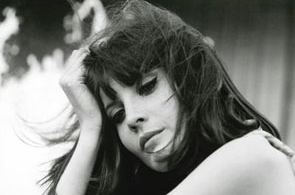
Failure seemed impossible, and Sandie steered her destiny with uncommon precision for one so young (she was still only 17). Detractors balked at her "gimmick" of always appearing barefoot on television, and Sandie often explained that due to virtual blindness she had frequently tripped over camera wires whilst performing, therefore, without shoes she could feel her way along and avoid catastrophe. Besides, it would hardly do for the purveyor of a new teen energy to be hidden behind enormous spectacles.
Sandie's mode of dress was not profound; she was the carefree girl of no stunning intellect who nonetheless knew what she wanted. 1966 began well with 'Tomorrow' (No. 9), Andrews on peak form, Sandie making the words sound even better than they actually were: "I don't like what I must do tomorrrrrowww"...
'Nothing Comes Easy' (No. 14) limped where others had sprinted: "Nothing comes easy/I had a hard time getting him/And I'm regretting it now..." The failure of 'Run' (No. 32) seems sinful in view of its great charm. Andrews took the most fundamental language and produced poetry. Chart wise, Sandie seemed suddenly down a hole, from which 'Think Sometimes About Me' (No. 32) was no rescue.
If the lights dimmed by the close of '66, then '67 began with a total blackout. Edgy, Sandie tried her luck elsewhere, disposed of Andrews, and the results were lame as 'I Don't Need Anything' (No. 50) written by Vance and Pockriss nipped the chart for just one miserable week.
Consumers would take refuge in its reliant b-side 'Keep In Touch', written, unsurprisingly, by Chris Andrews. Why Sandie became her own cuthroat by dumping 'Keep In Touch' for 'I Don't Need Anything' defies logic. It seemed that she suddenly lunged for a more mature audience, and she would pay severely for the change in style.
At the expense of her artistry, cutesy 'Puppet On A String' rode ripshod over the chart, and could quite easily be dismissed as a desperate attempt by Shaw to keep her foot in the door had not the same cuckoo mode of writing been repeated with the utterly oafish 'Tonight In Tokyo' (No. 21), a vulgar moan of no earthly value, and written by the same duo Vance and Pockriss.
This time there could be no escape hatch for Sandie, whose sanity had surely left her, who willingly surrendered her tempestuous reputation for the too painful 'Tokyo', the most abortive release of her career, and one which entirely rode on the success of 'Puppet On A String'. Not for the first time, Andrews rescued an inept disc with a distinctly listenable b-side, 'You've Been Seeing Her Again', which proudly stood with previous Andrews flips so sinfully shoved out of view, all of which equalled the perfection of their a-sides, such as 'Stop Before You Start', 'You Can't Blame Him', 'Hurting You', 'Long Walk Home' and 'Don't You Know'.
By the close of '67, Sandie re-chiselled her priorities, regained her consciousness, and lay herself at Chris Andrews' feet, and, prophetically, what was produced was surely enough to restore faith in the most faithless.
'You've Not Changed' (No. 18) crushed Sandie's prized exhibits of the past, punching vividly with heavy brass, leading to lashings of Shaw sentiment: "I do like your hair/And the clothes you wear/But if you wore rags you'd still look good to me.."
If time seemed against Sandie after the morass of 'Tonight In Tokyo', then 'You've Not Changed' cemented the cracks and justified any previous disappointments, as would her only hit of '68 'Today' (No. 27) which rang even more convincingly; the gliding strings of Ken Woodman turning a simple love song into opera: "Today - I can do without Today/Tomorow may be better..."
But of course it wasn't. Sandie's longest absence from the chart (a full year) lapsed between the delightful 'Today' and the impossibly flat-footed 'Monsieur Dupont' (N0. 6) which had Sandie aging 40 overnight. The sub-Euro romp 'Think It All Over' (No. 42) violently followed, ending the glittering assemblage of hits. It was 1969. The 60s were over, and Sandie Shaw would exist with them.
What trailed behind were a batch of vivacious records unmatched in standard by any other female voice in popular music. When her dignity wavered (with 'Puppet') the string was softened by three weeks at number one.
Shaw did not lapse into the papier mache momism of Cilla Black, or the Dick Whittington trivialism of Lulu. From 1969, Sandie married dress designer Jeff Banks, gave birth, got divorced, re-married (this time to Virgin brain Nik Powell), meddled lucklessly with Heaven 17 on a rework of 'Anyone Who Had A Heart', and for the coming year she plans a violent return to the fold amid producing her own television documentary on women in music, and hurling out the odd self-penned children's book. Whatever, Sandie's return to centre stage should thrill all individuals with ears.
Reprinted WITHOUT PERMISSION for non-profit use only. Photos of Sandie Shaw by unknown photographer. Reproduced without permission.
This news item/article dates from around the time of Sandie Shaw's studio collaboration with The Smiths. Originally appeared in Melody Maker.
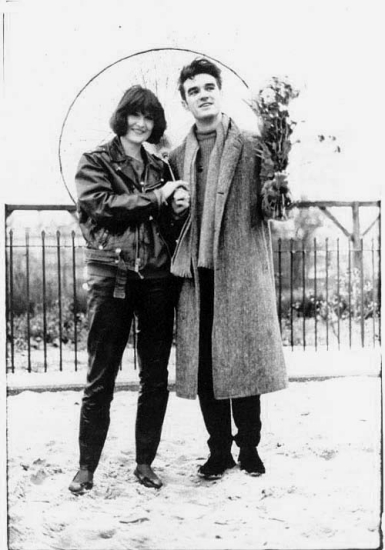
HAND IN GLOVE: Well, hand in hand actually. Of course, it's former Sixties barefoot girl Sandie Shaw alongside leading Smith Morrissey. Shaw and Smiths have just emerged from a studio collaboration clutching copies of Sandie's version of "Hand In Glove", a highly improbable partnership, no? "I thought The Smiths were right nutters when they started writing to me, I couldn't figure out what it was they wanted," Sandie confessed. "Then he sent me some tapes and my husband said I ought to meet them, so I did!" Morrissey, it seems, kept pestering Sandie until she agreed to a collaboration of some kind. "I just love their songs, they're so good to sing," she bubbled. "I said I'd go into the studio with them on the proviso that if I didn't like the result we'd scrap it - but we had so much fun and I think the single's great."
Evidently the persuasive Morrissey helped Sandie overcome the legendary shyness which has been known to lead her to beg interviewers in mid-conversation not to print anything. But will she work with the Gladioli King again in future? "Mmmm... maybe," she pondered. "I don't like to plan things in advance and my motives now are just to enjoy myself. There's talk of an album so we'll see. Knowing Morrissey he won't give me a moment's peace until we're back in the studio."
Of course, things have moved on a bit since Sandie won the Eurovision Song Contest in 1967 with "Puppet On A String". Apart from a guest slot on BEF's "Music Of Quality And Distinction" and a fleeting stage appearance alongside Chrissie Hynde, Sandie's kept well away from the music biz. She's written a couple of music books, is planning a documentary on women in music for the BBC and now has a 15-month-old daughter to go with a teenage one from her previous marriage. "I'd love to get on 'Top Of The Pops', mainly to prove to my teenage daughter that there's some life in the old bat yet! We're very close - we wear each others clothes and all that but I think she's still faintly embarressed when I start boogieing round the supermarket."
Meanwhile, this "women in music" TV thing sits close to Sandie's heart, though she won't go into details about the programme or when we might get a chance to see it. "I've always been interested in the role of women in music and how they cope," Sandie explained. "I've got such admiration for people like Chrissie Hynde and Annie Lennox who do it with such style.
"Chrissie's a friend of mine - she lives round the corner, we were pregnant at the same time. It was funny really - she seemed to think I was a pregnancy expert cos I'd done it before. I kept telling her it was so long ago that I'd forgotten."
Meanwhile, next stop "TOTP"? Much stranger things have happened.
Reprinted WITHOUT PERMISSION for non-profit use only. Photo of Morrissey and Sandie Shaw by Andy Catlin. Reproduced without permission.
SEE ALSO: Sandie 4 Morrissey
Morrissey and Marr's original letter to Sandie Shaw
Dear Sandie,
We could never begin to emphasize the endless joy we would feel if you would care to listen to our song with a view to possibly covering it.
Obviously the song was written with you in mind. It is an absolute fact that your influence more than any other permeates all our music. Without doubt we are incurable Sandie Shaw fans. Studying all your material, as we do day and night, we felt that your future musical direction must avoid the overt momism trap that most of your 60s contemporaries seized.
We have strong ideas about the musical backing which should accompany your version of 'I Don't Owe You Anything'. It should be upbeat and immediate; after all, the audience you left behind was a youthful one - the audience you must seize now must also be youthful. Ken Woodman's arrangement on such as 'Keep In Touch' or 'You've Not Changed' could easily be electric guitar. But let's leave the past behind, good as it was. We feel that your future needs an injection of high spirit and vengeance. Should you dislike 'I Don't Owe You Anything' we can supply others with variation. You must surely realize that your name is sufficiently on the lips of young people to demand interest in new, vital product. We would be honoured to provide material for your consideration. The Sandie Shaw legend cannot be over yet - there is more to be done!
Love forever,
Morrissey (Wordsmith/voice)
Johnny (multi-instrumentalist/composer)
THE SMITHS
This interview originally appeared in the April 21, 1984 issue of New Musical Express.
ON TO A SHAW THING
ADRIAN THRILLS heralds the second return of SANDIE SHAW with The Smiths, but wonders whether she's just Morrissey's puppet on a string.
FORGET FOR a moment her brash pop past and the involvement of the NME readership's favourite new act in her coming resurgence and be mindful of one fact: after exactly 20 years in the recording business, Sandie Shaw can still get remarkably passionate about her music.
And if the thought of that senior independent label Rough Trade releasing a single by a '60s pop icon like Sandie - albeit in an appealing partnership with The Smiths - offends the snob sensibility of a few misguided purists, it is of little concern to Shaw herself.
Still in her mid 30s - she had just turned 17 at the time of her first hit 'Always Something There To Remind Me' - she is in vivacious spirits when I arrive at RT's downtown Islington office for our interview.
Excitedly awaiting the arrival of the 12" mix of the single 'Hand In Glove'/'I Don't Owe You Anything'/ 'Jeane' from the pressing plant, she playfully chastises her press officer for the conspicuous lack of brandy in the hospitality cupboard before accepting an unsugared coffee and convincingly outlining her personal reasons for a return to the recording fray - although she is at pains to emphasize that her current activity should not be viewed as a comeback.
"I really enjoy singing now, whereas in the past I often felt that I was just going through the motions. The thing that has really made me want to work again is that I actually enjoy the physical, mental and spiritual act of singing. I feel like a reformed prostitute or something.
"For me, music is one of the most vital means of communication. It gets things across on one of the most fundamental human levels. It's something that goes deeper than just a set of lyrics."
Morrissey's obsession with Sandie's singing and carefree, natural pop persona has been well documented, but it wasn't until the Smiths' vocalist, a renowned man of letters, began penning epistles to Shaw that a meeting was arranged.
"Morrissey would send me letters along with some of his lyrics and some demo tapes, but I wasn't really that keen to get involved in the music business again. At first I sent the tapes back, but he kept on sending stuff. Eventually he sent me a copy of the artwork for their first single, the 'Hand In Glove' sleeve with the bum. I couldn't believe it! I remember saying to my husband that he had started sending me pictures of naked men with their bums showing!"
But once a meeting between Shaw and the band's songwriting duo Morrissey and Marr had been set up by Rough Trade's Geoff Travis, it became clear that The Smiths' intentions were noble, and Sandie now says she would work with no one else.
"Morrissey is an obsessive. He is obsessive about everything, but I can be a bit like that too, which is probably why we get on so well together. I find his songs very romantic, but in an adventurous sense rather than in a sloppy one. 'Hand In Glove' is real Joan of Arc stuff, and I love all that.
"Although he doesn't sing himself on the record, Morrissey always contributes. He was in the studio the whole time. If something wasn't right he would just give me one of those looks. If he's crying in the corner then you know that it's alright.
"I've learnt a lot from being with all of them. I've actually had to learn how to be spontaneous again. When I first started recording, things in the music industry were very fresh and raw and I always felt very uninhibited. But as you become more and more aware of the repercussions of what you do, you tend to change yourself to fit circumstances rather than changing them to suit you.
"Doing this has enabled me to regain some of that spontaneity. And that even extends to things like going on Ear Say and acting like an adolescent. Who cares? The purpose of going on TV isn't to turn on a million guys or make some girl wish she could look like me. You can't take it that seriously."
Sandie sups and smiles and it's hard not to picture her as the earthy, energetic Essex teenager who gatecrashed her way into Adam Faith's dressing room and burst into song with sufficient style to impress a watching agent and launch herself on a glittering singles career.
Along with the likes of Dusty, Cilla and Lulu, Sandie Shaw symbolised the new found vigour and optimism of an era in which female performers were being rapidly liberated from the constriction and conservatism of the '50s. Three number one singles - 'Always Something There To Remind Me', 'Long Live Love' and the banal, bouncy Eurovision winner 'Puppet On A String' - kept the barefoot babe in the limelight until the end of the decade.
But Shaw fitted comfortably into the coat of spurious maturity which the early '70s seemed to demand of female vocalists and - loath to lapse into the Saturday evening family entertainer's slot which was mapped out for her - her profile became increasingly lower.
Her absence was broken only by an unsatisfactory collaboration with British Electric Foundation on the 'Music Of Quality And Distinction' LP, the unwise choice of song - a cover of the Cilla hit 'Anyone Who Had A Heart' - hardly helping matters by harking back to the chanteuse's '60s heyday.
Now, however, Sandie is back in the present with one of the best singles of the year so far and plans to keep working. There is talk of a Rough Trade album with Morrissey producing, while she has already made a couple of guest appearances onstage with the group. Then there is a forthcoming documentary on women in the music business ("It's not so much the attitude towards women that has changed, but women's attitudes") and a children's book soon to be published.
"Until I met up with The Smiths, I didn't feel I had to do anything. There isn't any great rule that says you have to be busy all the time. If I'm not totally into something, then I don't see the need to involve myself.
"The only carrot that could drag me back into this was the chance where I could not only maintain some integrity, but also make it grow. So the current situation is almost ideal. Before this, I couldn't see anywhere where I could realistically fit in. I was quite happy to stay at home with my video and the washing up and confine any singing to the front room.
"The people that I'm working with at the moment are great. They tend not to push me into things, which is not what I've been used to in the past. They let you develop very naturally. It's great to work with them because they're very gentle like that."
Even charming?
"Very charming!"
Reprinted WITHOUT PERMISSION for non-profit use only. Photo of The Smiths & Sandie Shaw by Peter Ashworth. Reproduced without permission.
See the original article here
SEE ALSO: Sandie Shaw with The Smiths
The following three items review Sandie Shaw's 'Hand In Glove' single.
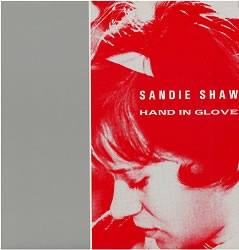
"I prefer this to the original version by The Smiths. Her voice adds a new appeal to the song! I bought the first two Smiths singles but was later rather put off by Morrissey's obnoxious and narrow-minded attitude towards other songwriters. But anyway I like the song and it will be a hit."
Unknown reviewer
Smash Hits
Reprinted WITHOUT PERMISSION for non-profit use only.
"I don't mind Morrissey's ardent adulation and overt fawning over her but I can't get the sight of Ms Shaw's arms and legs bouncing up and down in horrible adolescent anomaly on Ear Say last week. Great music, of course, bounding guitar work by Johnny Marr but a terrible idea to get Sandie Shaw to cover this Smiths special. Reduces it to a babbling cupcake. Write another song for her, Morrissey, please."
Unknown reviewer
The source of this review is unknown.
Reprinted WITHOUT PERMISSION for non-profit use only.
SINGLE OF THE WEEK
"Bearing in mind The Smiths' disappointingly turgid LP, their inauspicious stage show and Sandie Shaw's less than spectacular collaboration with BEF on their 'Music Of Quality And Distinction' album, this long-awaited pairing was potentially a sonic disaster spot. But once it becomes apparent how authoritively and soulfully Ms Shaw interprets both the swirling 'Hand In Glove' - The Smiths' first and best single - and the dreamily eloquent 'I Don't Owe You Anything', any misgivings fade.
Fuelled by Morrissey's infatuation with that voice and the singer's obvious enthusiasm for some decent material, the collaboration is a remarkable success, although the contribution of Johnny Marr - that chiming guitar man - cannot be overlooked. From a rustle in the bushes to a walk in the park, this is quite the best piece of vinyl in the column. Single of the week!"
Adrian Thrills
New Musical Express, April 7, 1984
Reprinted WITHOUT PERMISSION for non-profit use only.
See the original review here
To see Sandie Shaw perform 'Hand In Glove' with The Smiths on Top Of The Pops on YouTube, click here

Promotional poster
This interview with Sandie Shaw originally appeared in Record Mirror, May 5, 1984. By Graham K Smith.
GLOVE STORY
Mmmmm... I think a sex symbol is possibly the best thing to be..."
Thus spake wild Steve Morrissey last year before his jangle organisation The Smiths hit the heights and baggy-bum chic hit the nations' student unions. Now a sexual role model for a brand new legion of sensitive, disaffected youths, Mr. Morrissey's heroine, and lately, prodigy Sandie Shaw has other ideas -- "Morrissey sexy? Oh no ... I don't find him sexy at all!"
How about a hero? -- "Nearly all my heroes are actresses ... like Shirley MacLaine, or singers like Joan Baez and Joni Mitchell. It's not so much their work, more the way they approach things..." ... so no Morrissey?
"Well ... if he works a bit harder he might come on -- he'll have to keep at it for a while. Morrissey hasn't had any failures yet -- so I'd like to see him have a few failures and see how he handles that!"
'Hand In Glove' is the reason for our little talk. The first Smiths single, a murky but muscular indication of the things that were to come, has undergone some stringent pop scrutiny and re-emerged with a sparkling Smithsonian sheen, Ms Shaw's breathless and enthusiastic vocal injecting the necessary stimulant to guarantee its present position -- lunging purposefully into the Top Ten. She's been there before, you may (if you're older than Jim Reid) remember. She had hits. And she's hitting again.
But tell me, Sandie, do you actually like these uncouth Mancunians and their wild and leery music?
"Now I feel very close to Morrissey ... but when he first sent me a tape ... It was with a fan letter and I really don't know why I listened to more than two bars of it -- it was awful ... really awful. So I sent it back and said I couldn't make head or tail of it . So they sent me another version ... and I sent that back too!"
So what on earth possessed you to look any further... ?
"In the end Morrissey ended up in my front room and when I actually met him I decided I could trust him -- I took it totally on trust. I still didn't even like the stuff until I got in the studio and started singing it. I then realised that I'd wanted these songs for ages -- not so much the style -- more the passion. I'd missed that, and everything else had just seemed so cliched nowadays. Now it's either music for the genital or the head ... not much for the heart which is what I've always preferred."
Had you been waiting for the opportunity to get back into the singing swing?
"No, not really. Everyone had always been nagging me and nagging me to sing again, but the more they nagged me the less I actually wanted to do it. I'd been so disillusioned with it in the past -- I don't particularly enjoy being famous. I can't understand why people want to be popstars -- the thought of that album followed by a tour routine -- it's so boring. The only appeal is being able to communicate with some people who might feel the same as you."
How important is success, then?
"I hate that desperation people have. It's always been much better if you're more natural, doing something if it feels right. That's why I stopped before -- it wasn't fun, it wasn't successful and I was doing rubbishy songs. Artists shouldn't be taken in by commercial success."
Two years ago Sandie released a cover of 'Anyone Who Had A Heart' as part of the admirably ambitious but ill-fated BEF 'Music Of Quality and Distinction' -- had that been a satisfying experience?
"No, it wasn't successful in any sense. It wasn't commercial and I didn't get anything out of it in a personal or artistic way. I was uncomfortable with BEF. It's much better now -- it's still traumatic but once I've actually done it I feel better."
For someone with such laissez faire notions towards the pop rat-race, do nerves ever bother you?
"I was so nervous before the Hammersmith Palais thing (Sandie recently guested on 'Hand In Glove' [Sandie actually guested as vocalist on 'I Don't Owe You Anything' - BB] at the climax of a London Smiths show). I'd been sitting at the side of the stage watching and they went marching off to the dressing room to look for me. When I wasn't there they thought I'd pissed off because I didn't like the show! So they're panicking up there and I'm sitting down on the stage thinking 'They don't want me to go on, they've changed their minds'. Eventually they found me and were begging me to go on ... Afterwards Morrissey rang me up at about three in the morning and said 'Well?' -- I just told him I could have done an hour, one song just wasn't enough!"
Is playing the pop game in 1984 much the same as it was in 1964?
"Oh no -- music now is terribly boring -- and it doesn't seem to reflect what's going on with young people. Film and TV is much more reflective of that. When I was a kid I thought that I could do anything, be anything -- so therefore I did it. People now are so much more dependent upon the State, they let the State make all the decisions. In the 60s everyone geared their creativeness towards music -- artists, writers, everybody. Nowadays it's diversified -- I'm sure they must be somewhere ... maybe they're writing for pop magazines!"
So if nothing in pop apart from those sizzling Smiths offers any solace where must we look for future Sandie Shaw contributions to popular culture?
"On TV. With television you can think of an idea and get it across immediately. I'm working on a programme about women in music -- this has only really been around since the early sixties and I find how women have actually evolved within such a sexist industry really interesting. It's about how people use influence, how they're aware of it."
Reprinted WITHOUT PERMISSION for non-profit use only.
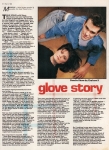
Click to enlarge original item
For more detail about Sandie Shaw's onstage appearances on the British leg of the Smiths' debut album tour, click on the image below
Sandie Shaw on stage with The Smiths at the Hammersmith Palais, March 12, 1984
Photo by unknown photographer. Reproduced without permission.
